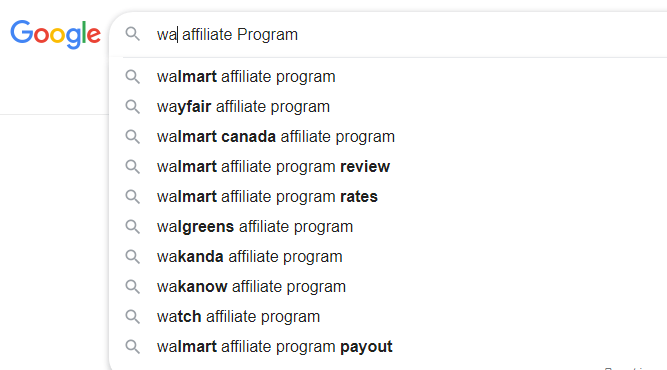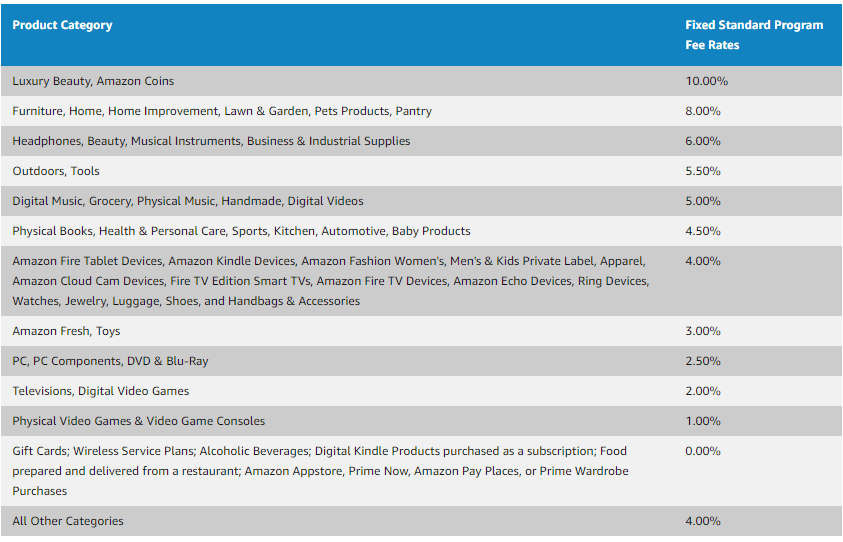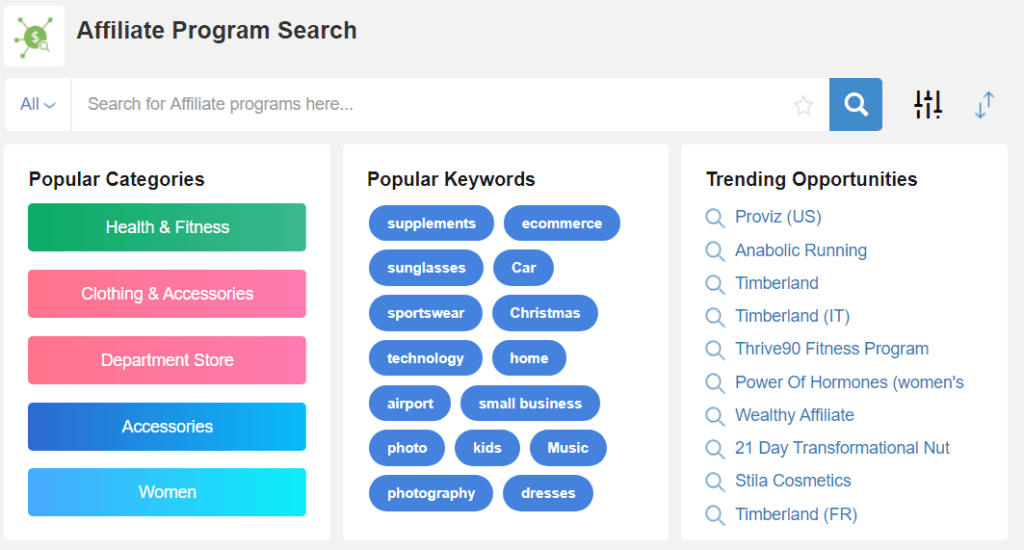One of the things I often do in this blog is to present you guys with different niches and revealing their potentials in the affiliate marketing industry. It’s not like I’m an expert or anything like that. I just know how to search for affiliate programs using a few tricks and the good news is, you can be good at it too.
(1) Target a Specific Brand
Nowadays, there’s no tool more dynamic than the Google search bar. It’s literally the answer portal to all the questions consumers have and for marketers, it can unlock many opportunities we didn’t know existed.
I usually like to start my search with a brand name followed by the ‘affiliate program’ key phrase. For example, Starbucks affiliate program or Nectar Sleep affiliate program.

The first few results should point you to the brand’s affiliate page (if it exists). It will provide some information about the offers and how you can sign up. Sometimes, you may even find a blog or two that write reviews about the program so that’s worth checking out too.
Alternatively, you can visit the brand’s website and look at the footer area for any link to an affiliate program. Sometimes, it’s also called a referral program and you’re given a referral link just like an affiliate link.
The difference here is that referral links are usually shared with friends and families – not so much with the general public – and instead of a commission, you’re paid in credits to offset in-store purchases. I considered this as a form of earning too especially if you’re a long term customer of that brand.
Brandable companies usually sell several flagship products that serve specific purposes so you don’t usually find a lot of merchandise on sale. As such, the incentive payout can be relatively lucrative. For example, Starbucks only sells coffee and Nectar Sleep only sells memory foam mattresses.
(2) Target a Specific Niche
Sometimes, when you’re new to a certain niche, brand names may not be readily familiar. In this case, I recommend searching using the niche keyword followed by the keyphrase ‘affiliate program’. For example, you could type;
- make-money-online affiliate programs
- bookstore affiliate programs
- makeup affiliate programs
- gourmet coffee affiliate programs
So, instead of just getting one result, you’d usually end up with a bucket full of programs, compiled from different sources. The good thing about this is that you get a lot of ideas, but the downside of it is that some of the information may be redundant and even outdated. Therefore it’s crucial that you filter what can and can’t be used.
(3) Get to Know Your Online Stores
Affiliate marketing grows hand-in-hand with eCommerce because that’s the first thing a customer sees when being referred to a site. The more robust the online stores, the better the user experience and the more sales conversions you’re likely to make.
If you know of a specific store brand, check the site for any affiliate program/referral links. For example, I ordered my cat food from Chewy and found it has got an affiliate program so that’s great. Alternatively, you can Google search ‘niche name + online stores’ like so – ‘baby products online stores’.
Using these keywords, I discovered that Buy Buy Baby – one of US largest chain stores for young children – actually has an affiliate program AND I’m not even in the baby niche. You can practically do this for any niche with retailers selling physical products online.
The common problem you’d encounter using this method is that Google will only show sites relevant to the region that you’re in. If your targeted audience is outside of the US, remember to add a regional keyphrase into the search term.
Amazon is probably the most popular eCommerce site known to many. Millions of products are sold on the marketplace which makes it an ideal platform for online shopping. When you join the Amazon associate program, you’re entitled to earn variable commissions across most product categories.

Besides Amazon, there are also other online stores that could offer much more in terms of niche-specific products, attractive price points, and also slightly higher commissions than that of Amazon. Here are some stores I’ve reviewed in the past.
- AliExpress – similar to Amazon but most of the stuff comes from China-based suppliers. Offers free shipping worldwide.
- Etsy – a marketplace for arts and design-related items coming from all over the world.
- ThredUp – a marketplace that resells second-hand clothing, based in the US.
- Zappos – a huge online store for shoes and handbag products.
(4) Join Affiliate Networks
Whether you’re searching through brand names, niches or stores, there’s a good chance that most of these programs are managed by a group of companies called affiliate networks. When signing up, you actually need to join these networks first, get approved before you’re eligible for a particular program.
Here’s a list of networks that I am part of.
- Admitad – currently works with publishers from Asia, Eastern, and Central Europe. It’s home to one of Amazon’s competitors, the AliExpress affiliate program.
- Awin – hosts more than 15K brands across all sectors. It has great tools for affiliates to generate links and track performance. Requires a $5 sign-up fee which is refundable upon receiving your first payout.
- CJ Affiliate – an established network that provides excellent tools to understand your targeted audience. You will find a lot of reputable brands here by customizing using niche keywords, product categories, and serviceable areas.
- Clickbank – a network that hosts mostly digital products like membership sites, eBooks and online training. It also runs an in-house training program called the Clickbank University. Most popular for internet marketing offers.
- FlexOffers – gives access to more than 12K programs in various product categories. The commission payout is slightly lower than other networks. Most popular for its credit card program offers. Pays affiliate on a Net 7 and Net 30 basis.
- Impact – a robust marketplace for affiliates and brands to build long term relationships. The sign-up process is more stringent than other networks and your account needs to be verified before you can apply to other brands.
- Rakuten Marketing – a top network for affiliates and influencers to discover new brands. It comes with educational materials to help you choose the right brand for your site. You will also find a lot of top brands listed here.
- ShareASale – this network became a part of AWIN in 2017. It has many offers in the creative, home and lifestyle niches. Its Top 100 rank feature is a good place to search for new and upcoming brands for your blog.
(5) Join Wealthy Affiliate
Wealthy Affiliate started in 2005 and it’s basically a community and training platform that teaches about affiliate marketing. One of the features included in the membership area is the affiliate program search engine whereby one can easily browse for advertisers/merchants using popular categories, niche keywords or trending opportunities.

The directory features brands/companies from selected affiliate networks and each program summarizes what you need to know about the product, the offers as well as reviews from other marketers who have tested the product/program themselves.
What I like about this are the convenience and the clear detail layout, but because it’s still a new feature, there isn’t as much feedback as you’d hope. Still, I think it’s a great site for newbies to discover opportunities for their affiliate blogs.
Wrapping Up
So now that you know how to search for affiliate programs with just a few clicks, let me share a few more tips related to this topic.
- Before joining any programs, make sure you’ve got a WordPress site set up and written a few contents related to your niche. It’s by far, the best platform for blogging and getting ranked on the search engines for free traffic.
If you’re new to this or have trouble getting one, the SiteRubix builder can help you launch a new site within minutes. Go give it a try!
- Don’t apply for programs that are irrelevant to your niche because recommending them can confuse readers with what your site is about. For example, it doesn’t make sense to talk about clothing if you’re in the cooking niche.
- Pick one or two products in the beginning as your main recommendation. They can either be physical or digital products. Focus on the quality, value, and user experience, instead of just the commissions alone. Recommending useful products is the basic foundation for building a long term successful online business.
I hope you’ve gained something from reading this article. If you use other ways to search for affiliate opportunities or have other comments to add, please leave them in the space down below.

Google is a very powerful tool to search for such. I actually use the alphabet soup method to find keywords and niches. The same technique works for searching affiliate programs as well.
I am so going to bookmark this. All these 5 points were very useful for starting my blog. I also learned a lot about buying comments for your blog. It never occurred to me that multiple comments coming from the same computer could be flagged as spam. That’s something to take note of.
No problem Sonny. Glad you benefited from this.
This was a very helpful article on finding affiliate programs especially for someone new to the field. I hadn’t thought of using Google to search for affiliate programs. I also need to check out Clickbank and see if there’s any offering related to my niche.
Do you know of another competitor to Amazon in the US? I have bad experiences with Amazon and their commissions are pretty low. Thanks.
Hi Paula, there’s an online retailer called Jet.com and it used to have an affiliate program with Rakuten Marketing. But the last I check, the program is no longer listed on the network so I’m not sure if it’s still active or not. Unfortunately, there’s no competitor that can match the size of Amazon – at least for now.
If you’re interested in higher commissions, look for a more niche or brand-specific products instead of going through big retailers like Amazon. Use tip #2 and #3 that I mentioned above.
You suggested to create a website and add a few posts before applying for affiliate networks, I guess this is because some of them require an established website. My question is – which one of them has the easiest acceptance process for a newbie affiliate marketer with a fairly new website?
Hi Jordan, most affiliate networks accept your application without any fuss, except for Impact. It’s THE individual affiliate program that will want to review your website beforehand. Having said that, I find that FlexOffers tend to be more lenient with their acceptance rate.
Great post. While I would have probably selected my niche before looking for affiliate programs, I love the sections on niche selection and your list of affiliate marketing companies. I also enjoyed finding out a bit more about AliExpress. What kind of commission does Ali pay compared to Amazon Associates?
Hi Andy, AliExpress has a few categories that pay more than the regular 4% by Amazon and it ranges between 5.4% to 6.9%. The cookie lifetime is 3 days compared to Amazon’s 24 hours window. You can find out more about making money with AliExpress here.
While finding affiliate programs to join can be relatively easy in some niches, it can be more challenging in others. For these reasons, it is important to follow a guideline that can make the process seamless. I always start with Google since it’s the ultimate go-to for all queries. One can find a lot of useful information by performing a simple search and expand the ideas using the techniques that you mentioned.
Hi Rhain. Yes, some affiliate programs are tricky to find, especially those that lack a strong online presence. But with more companies bringing their brands online and using affiliate marketing to increase sales, we should see more opportunities in rare niches in the next few years to come.